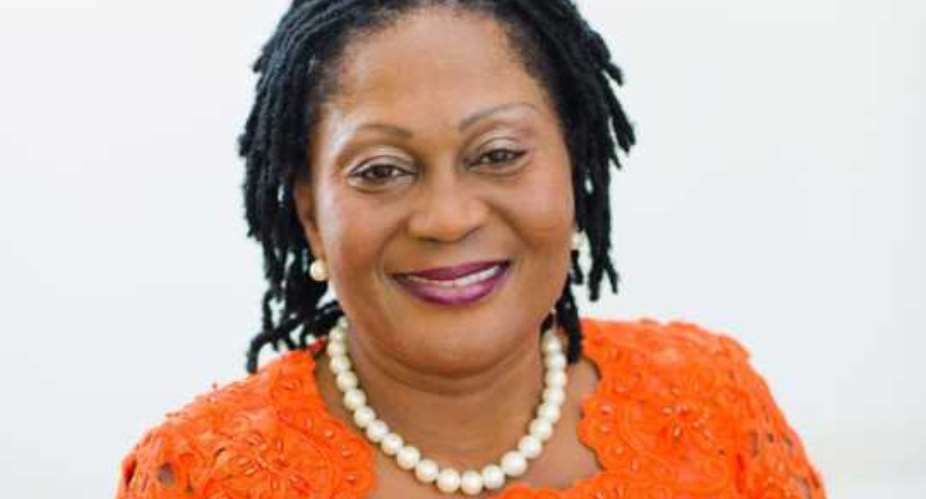Takoradi, Dec 1, GNA - Ghana's First Lady, Mrs. Lordina Mahama, has underscored the need for stakeholders in the health sector to form advocacy groups and join forces in fighting cervical cancer, which she said, had become the number one killer of women in Ghana and Africa as a whole.
She noted that that the devastating effect of cervical cancer required that stakeholders, including opinion leaders in the communities, supplemented the efforts of the health workers to combat it.
She pointed out that a woman affected by cervical cancer, did not suffer alone, but it had great consequence on families, society and the nation at large, since women were key in the running of the home.
Mrs. Mahama whose speech was read on her behalf by Dr. Gloria Quansah-Asare, Deputy Director of the Ghana Health Service at the Annual General Meeting of the Ghana Medical Women Association in Takoradi, said cervical cancer, though preventable, continued to claim lives of women accounting for over 2,000 deaths.
The Conference was held on the theme: "Cervical Cancer, Epidemiology and current policy, screening modalities and treatment options in Ghana."
She called for multiple action, exposure and massive sex education, as well as screening centres, as a radical measure of controlling the disease
Dr. Kofi Effah, Consultant Obstetrician and Gynecologist at the Battor Hospital in the Volta Region, said it was far better to have the first screening around age 20 onwards, as against the national policy which advocated screening from age 30.
In Ghana, the disease, though preventable, continues to claim lots of lives and is now the topmost on the cancer list of women aside breast cancer.
Dr. Effah added that the policy on cervical cancer was still at the "gestation" stage, a worrying trend for the country's human resource growth.
The World Health Organisation (WHO) has warned of more women likely to die from the disease in 2025, if strong measures are not taken to curb or stop the current trend of deaths.
Dr. Effah mentioned that cervical cancer formed 28.7 percent of reported cases in Ghana with almost 1500 deaths, and called for the establishment of centres at strategic places to encourage voluntary screening, since currently there was none.
This, he noted, had resulted in women reporting for treatment when the disease had reached the advanced stage, saying that early screening could save lives, since the disease was preventive.
Dr. Richard Anthony, Western Regional Chairman of the Ghana Medical Association, said women were the lifelines of the home, families, and the nation as a whole, and called for urgent measures to address this national health issue.
Dr. Elizabeth Esi Crentil, Senior Specialist Obstetrician and Gynecologist, said various activities had been undertaken since 2010 to create awareness and sensitize women on this disease.
She mentioned some mode of contracting the disease and risk factors as having multiple sexual partners, HIV, the use of nicotine and increased parity.
GNA





 We’ll no longer tolerate your empty, unwarranted attacks – TUC blasts Prof Adei
We’ll no longer tolerate your empty, unwarranted attacks – TUC blasts Prof Adei
 Bawumia donates GHc200,000 to support Madina fire victims
Bawumia donates GHc200,000 to support Madina fire victims
 IMF to disburse US$360million third tranche to Ghana without creditors MoU
IMF to disburse US$360million third tranche to Ghana without creditors MoU
 Truck owner share insights into train collision incident
Truck owner share insights into train collision incident
 Paramount chief of Bassare Traditional Area passes on
Paramount chief of Bassare Traditional Area passes on
 Two teachers in court over alleged illegal possession of BECE papers
Two teachers in court over alleged illegal possession of BECE papers
 Sunyani: Victim allegedly shot by traditional warriors appeals for justice
Sunyani: Victim allegedly shot by traditional warriors appeals for justice
 Mahama vows to scrap teacher licensure exams, review Free SHS policy
Mahama vows to scrap teacher licensure exams, review Free SHS policy
 Government will replace burnt Madina shops with a new three-story, 120-store fac...
Government will replace burnt Madina shops with a new three-story, 120-store fac...
